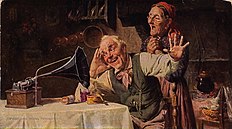Pleasure
Pleasure is an emotion. It is the opposite of pain. Humans and many other mammals feel pleasure.[1] People feel pleasure when they do something that is fun or that feels good.

Pleasure in neuroscience
changePleasure is studied in neuroscience.[2] Neuroscientists have mapped pleasure "hotspots" in the brain.[2] Pleasure is important for a person's mental health and well-being.[2] The loss of pleasure is common in people with mental illnesses like depression, schizophrenia, and addiction.[2]
Pleasure in psychology
changePleasure is studied in positive psychology.[3] How much pleasure someone feels changes from person to person. Pleasure depends how special something is. There is no rule that says what pleasure is for every person. [3]
Sigmund Freud wrote about the "pleasure principle" in the 1920 essay Beyond the Pleasure Principle.[4] According to Freud, the pleasure principle is what drives people to do things that give them a feeling of immediate gratification.[4]
Pleasure in philosophy
changeThe ancient Greek philosopher Epicurus said that people feel the most pleasure possible when they have no suffering.[5]
Hedonism is another philosophy that is focused on pleasure. It says that pleasure is good.[6] In Hedonism, people focus on pleasure and avoid pain.
Utilitarianism is a philosophy that focuses on pleasure. It says that morality requires that people do what has the most utility for the most people.[7]
Related pages
changeReferences
change- ↑ "Videos of Pleasure-elicited Reactions". Archived from the original on 2018-01-25. Retrieved 2020-12-30.
- ↑ 2.0 2.1 2.2 2.3 Kringelbach, Morten L.; Berridge, Kent C. (2010). Pleasures of the Brain. Oxford University Press. ISBN 9781444357929.
- ↑ 3.0 3.1 Lopez, Shane J. (2011). The Encyclopedia of Positive Psychology. John Wiley & Sons. ISBN 9781444357929.
- ↑ 4.0 4.1 Hothersall, D. 2004. "History of Psychology", 4th ed., Mcgraw-Hill:NY p. 290
- ↑ The Forty Principal Doctrines Archived 2016-02-12 at the Wayback Machine, Number III.
- ↑ Hedonism, 2004-04-20 Stanford Encyclopedia of Philosophy
- ↑ Bentham, Jeremy (1776). "A Fragment on Government". Retrieved 31 January 2013.